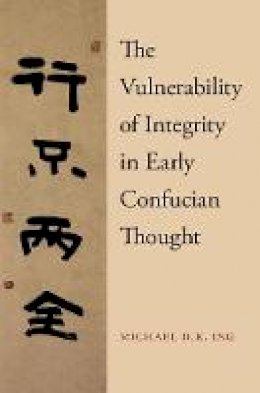
Stock image for illustration purposes only - book cover, edition or condition may vary.
The Vulnerability of Integrity in Early Confucian Thought
Michael Ing
€ 204.54
FREE Delivery in Ireland
Description for The Vulnerability of Integrity in Early Confucian Thought
Hardback. This book is about the necessity, and even value, of vulnerability in human experience. In it, Michael Ing brings early Chinese texts into dialogue with questions about the ways in which meaningful things are vulnerable to powers beyond our control; and more specifically, how relationships with meaningful others might compel tragic actions. Num Pages: 304 pages. BIC Classification: HPDF; HRAB; HRKN1. Category: (G) General (US: Trade). Dimension: 235 x 156. .
The Vulnerability of Integrity in Early Confucian Thought is about the necessity, and even value, of vulnerability in human experience. In this book, Michael Ing brings early Chinese texts into dialogue with questions about the ways in which meaningful things are vulnerable to powers beyond our control; and more specifically, how relationships with meaningful others might compel tragic actions. Vulnerability is often understood as an undesirable state; and as such, invulnerability is preferred over vulnerability. While recognizing the need for adopting strategies of reducing vulnerability in various situations, The Vulnerability of Integrity demonstrates that vulnerability is far more enduring in human experience, and that it enables values such as morality, trust, and maturity. Vulnerability also highlights the need for care (care for oneself and for others). The possibility of tragic loss stresses the difficulty of offering and receiving care; and thereby fosters compassion for others as we strive to care for each other. This book is structured to explore the plurality of Confucian thought as it relates to the vulnerability of integrity. The first two chapters describe traditional and contemporary views that argue for the invulnerability of integrity in early Confucian thought. The remaining five chapters investigate alternative views. In particular these later chapters give attention to neglected voices in the tradition, which argue that our concern for others can, and even should, lead to us compromise our integrity. In these cases we are compelled to do something transgressive for the sake of others; and in these situations our integrity is jeopardized in the transgressive act.
Product Details
Publisher
Oxford University Press Inc
Format
Hardback
Publication date
2017
Condition
New
Weight
28g
Number of Pages
312
Place of Publication
New York, United States
ISBN
9780190679118
SKU
V9780190679118
Shipping Time
Usually ships in 15 to 20 working days
Ref
99-4
About Michael Ing
Michael D.K. Ing is an Assistant Professor of Religious Studies at Indiana University, Bloomington.
Reviews for The Vulnerability of Integrity in Early Confucian Thought
The Vulnerability of Integrity in Early Confucian Thought is an excellent addition to a growing number of works that draw on Confucian sources to enrich the contemporary ethical discourse. Ing's strengths as a thinker and a writer allow him to render the complex moral concepts and dilemmas described in classical Confucian sources intelligible to modern readers who are not necessarily well-acquainted with this tradition... His efforts in making the works of early Chinese thinkers accessible to ethicists that are interested in learning about Confucianism but do not have the training to read the original texts render this book invaluable and deserving of the highest praise.
Ori Tavor, JAAR
[S]tudents of Chinese philosophy will benefit from considering its methodological stance, and readers of other academic as well as political and social circles would find in The Vulnerability of Integrity a culturally-unique reiteration of a plea, shared by several contemporary virtue ethicists, for the recognition of guilt and regret as markers not of moral failure but of moral stature.
Sharon Sanderovitch, Reading Religion
The book is well argued, well presented, and a pleasure to read... The volume is an important contribution to the discussion of ancient Chinese thought and contemporary Confucian ethics.
Barbara Hendrischke, Religious Studies Review
The volume is an important contribution to the discussion of ancient Chinese thought and contemporary Confucian ethics.
Barbara Hendrischke (University of Sydney), Religious Studies Review Vol.44
There are many things going on in The Invulnerability of Integrity that will serve to open exciting new avenues of future exploration in Chinese philosophy... As a model of contemporary Chinese philosophy, it will have a broad appeal to students and teachers of early Confucianism as well as of contemporary philosophy.
Thomas Michael, China Review International
Ori Tavor, JAAR
[S]tudents of Chinese philosophy will benefit from considering its methodological stance, and readers of other academic as well as political and social circles would find in The Vulnerability of Integrity a culturally-unique reiteration of a plea, shared by several contemporary virtue ethicists, for the recognition of guilt and regret as markers not of moral failure but of moral stature.
Sharon Sanderovitch, Reading Religion
The book is well argued, well presented, and a pleasure to read... The volume is an important contribution to the discussion of ancient Chinese thought and contemporary Confucian ethics.
Barbara Hendrischke, Religious Studies Review
The volume is an important contribution to the discussion of ancient Chinese thought and contemporary Confucian ethics.
Barbara Hendrischke (University of Sydney), Religious Studies Review Vol.44
There are many things going on in The Invulnerability of Integrity that will serve to open exciting new avenues of future exploration in Chinese philosophy... As a model of contemporary Chinese philosophy, it will have a broad appeal to students and teachers of early Confucianism as well as of contemporary philosophy.
Thomas Michael, China Review International
